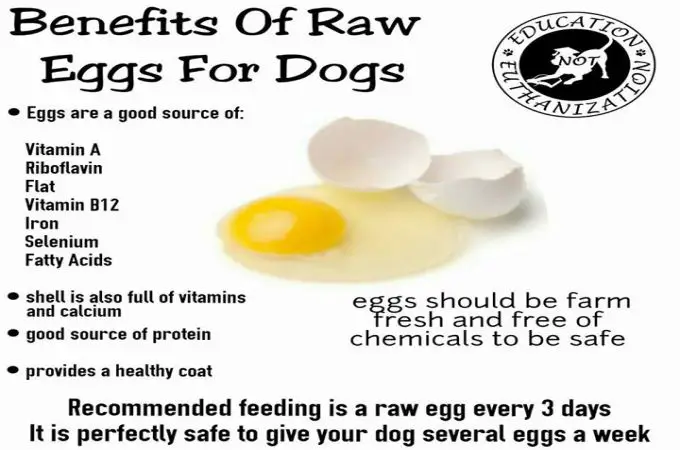Eggs are nutritious, delicious and have lots of nutrients that can be beneficial to humans. Humans are not the only ones who can benefit from eating eggs; your dog can eat them as well. If you’re planning on giving or adding eggs to your pet’s diet, then it is best if you know why these things can be substantial. Below are some information about this excellent food and how it affects your dog’s well-being.
Nutrients of Eggs That is Good to Your Dogs
Nutrients in various food are a boon to the health of a dog and an important factor in its growth development. Eggs have some nutrients that are beneficial to your pet.
- Fatty acids – These nutrients are a good source of fuel for metabolism and muscular contraction. There are three types of fatty acids: unsaturated, saturated and essentials.
- Vitamin A – Maintains the dog’s eye health, antioxidant activity, bone development, skin and cellular health.
- Selenium – boosts the immune system and cognitive functions of your pet. Selenium works with vitamin E to prevent free radicals from forming, which reduces cancer.
- Riboflavin – Aids in the growth development of dogs, prevents hair loss as well as dermatitis, improves metabolism and promotes healthy corneal. Lack of Riboflavin can result in ataxia, physical weakness, standing inability, inflammation of the gastrointestinal tract’s mucous membrane and hemorrhagic adrenals.
- Iron – Prevents your pet from suffering anemia. Anemia is the result of iron deficiency. This deficiency can lead to undeveloped red blood cells that cannot carry oxygen to other parts of the dog’s body.
- Folate (Vitamin B9 or Folic Acid) – A critical nutrient for female dogs that are pregnant. Also, vitamin B9 prevents defects in the neural tube during a dog’s pregnancy and fetal development. This vitamin allows the dog to give birth to healthy puppies.
- Vitamin B12 – Stops gastrointestinal diseases and anemia in your dog. Vitamin B12 also helps a dog absorb as well as digest other nutrients. Should your dog lack vitamin B12, it will eat voraciously just to get enough nourishment.
- Essential amino acids – Consist of 10 amino acids: valine, arginine, tryptophan, histidine, threonine, isoleucine, leucine, phenylalanine, lysine, and leucine. Essential amino acids are necessary for the repair, maintenance, and cell growth of your pet’s body.
- Avidin – Regulates the number of biotin in a dog’s body by binding them to the intestine. Biotin or Vitamin B is necessary for your dog’s health, but too much of them will cause nerve transmission defects, scaly skin, and high blood cholesterol.
- Protein – Help maintains the health of your dog’s skin and coat. Lack of protein causes the skin to darken and weaken, making your pet vulnerable to infections and wound that won’t heal. The coat hair will become brittle or dry, with patches of hair falling off.
- Calcium – Affects the dog’s body by improving the muscle functions, vascular contraction, and vasodilation of your pet. It also strengthens the bones and teeth of your pet. Be careful of giving your pet too much calcium (or making it eat too many eggs) as well as not giving it enough calcium. Puppies benefit from calcium intake since it can assist them in their growth development
The last two nutrients, protein and calcium, are abundant in the shells. At first glance, egg shells don’t look edible, but you can serve them to your dog. The best way to serve the shells is to crush them into fine pieces and sprinkle half a teaspoon of those shells into your dog’s regular meal or kibble. You can use a mortar with pestle, coffee grinder, or food processor. If you want the shells to be safe from bacteria, try boiling them and dry them thoroughly before serving. You may store the shells in the refrigerator if you want to use them at a later date.
Can Dogs Eat Raw Eggs?
Raw meals are a popular diet for pet owners to serve as meals for their pets. In fact, dog owners like to use fresh food, including eggs. One concern of dog owners is whether raw eggs are safe to give to them. It’s a very understandable concern since E.coli and Salmonella are some things you don’t want your dog to get. You will be happy as a dog owner to know that the answer is a definite yes. Raw eggs are good for your pet since they have certain nutrients that are present. Below are those essential nutrients for your dog:
Avidin – This is the nutrient that is responsible for the cellular growth, good skin and coat as well as improving the dog’s fatty acid metabolism.
Biotin – Enhances the skin’s health, improves metabolism, aids the digestive tract, helps in cell growth and treats various nerve pathology. Fat metabolism and transference of carbon monoxide are other functions of biotin.
Can Dogs Eat Scrambled Eggs?
Yes, dogs can eat scrambled eggs. Just remember not to put any spice, sugar, and salt. Adding the spices, sugar, and salts to this food makes it delicious for humans, but they tend to have adverse effects on dogs when they’re in high quantities. If you want the food to be a more substantial meal, try mixing it with the dog’s other meals or use them as an occasional treat or snack.
Can Dogs Eat Boiled Eggs?
You can often see the use of non-stick ingredients like margarine, oil, or butter when it comes to cooking an egg. If you don’t like the margarine, oil, or butter add-ons, you can try the boiling method instead of the fried method of cooking. Hardboiled is easy to serve your pet since it can be diced or cut into chunks then add to the usual kibble of your dog.
If Dog Eats Too Many Eggs, What will happen?
Moderation is a must when your dog is eating eggs. You can feed your dog several eggs raw or cooked a week, but make sure that it is not the mainstay of its diet and meal. Some dogs get an upset stomach due to the influx of protein unless your pet is a very active animal. Also, the enzyme inhibitors are also present and will negatively affect the normal function of your dog’s digestion.
Avidin and biotin are useful for your dog’s health, but if the former exceeds the latter, then your dog is going to have a problem. Too much avidin tends to interfere with biotin’s functions like fat metabolism, digestive tract aid, and cell growth.
Also, replacing your dog’s main meal with an egg only diet will cause an imbalance in its nutrient intake. Meat, veggies, and fruits have nutrients not found in eggs, so excluding them will harm your pet.
Can Puppies Eat Eggs?
Like adult dogs, puppies are capable of eating eggs. The nutrient of the food will help your puppy grow healthy and aids in its growth development. Unlike adult dogs, puppies must not be feed too much since their stomachs as this point is small.
That’s all there is to it about eggs and how they are beneficial as well as healthy to your precious pet. The inexpensive yet healthy nature of eggs ensures that both humans and dogs will enjoy eating them. So give a go and try feeding your dog with this delicious, wholesome food.
READ MORE:
- BEST VEGETABLES FOR DOGS
- FRUITS THAT ARE GOOD AND BAD FOR DOGS
- CAN DOGS EAT PEANUTS
- BAD VEGETABLES FOR DOGS
- CAN DOGS EAT MUSHROOMS?




Hi! I’ve just read your article and It’s great except that I feed my dogs eggs everyday at every meal for their sole protein source With Sojo’s veggie mix. My Coonhound gets 2 eggs in the AM and 2 eggs in the PM my small yorkies get 1 ea. in the AM and 1ea. in the PM. Why are you saying one every three days? It’s complete with everything they need please try and enlighten me to this.
Thanks Colleen